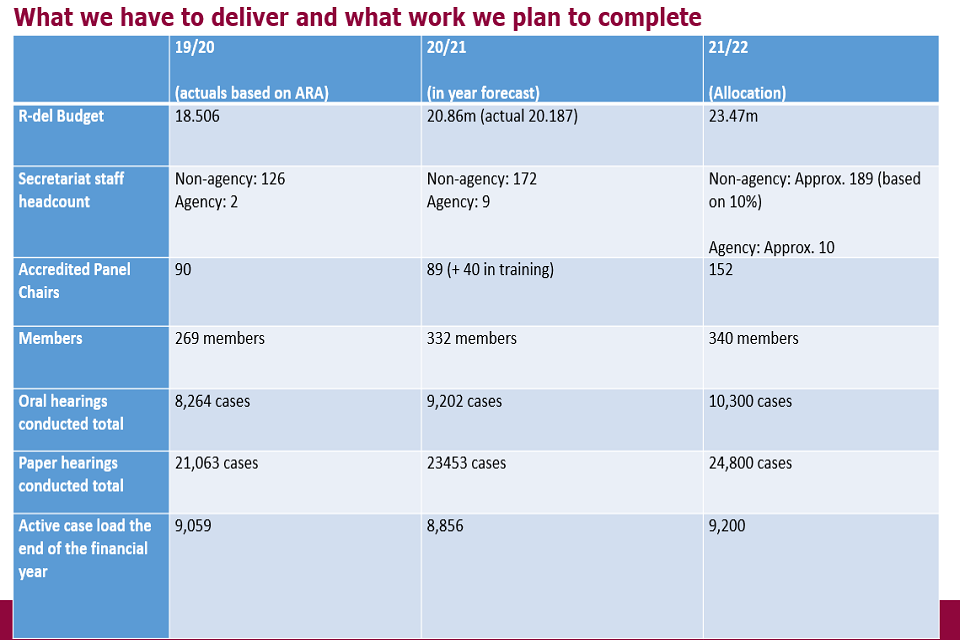Parole Board Chief Executive's blog - August 2021
CEO Martin Jones discusses the Parole Board's Business Plan 2021-2022 and outlines its priorities for the next 12 months.

This week, the Parole Board has shared its 2021 to 2022 Business Plan which includes our strategic aims and priorities over the coming year.
It will be no surprise to hear that 2020 provided the Parole Board with one of its most challenging periods in recent years, but one which we have handled with great professionalism, agility, and adaptability.
Despite the huge challenges and a number of extended national lockdowns forcing prisons to close and face-to-face hearings to be halted, the Board has made more decisions than it did the previous year, keeping the system moving efficiently and effectively for victims and prisoners despite initial concerns that a backlog may emerge.
Now, our biggest task of the this year will be recovery from the pandemic, continued use of remote working and an increased use of video and telephone hearings as we head towards the “new normal”.
Figures for 2020/21 show the Board conducted 9,202 oral hearings – the vast majority of these by video or telephone – as well as 23,453 paper hearings. Those figures are expected to continue to grow next year, with latest projections estimating 10,300 oral hearings and 24,800 paper hearings.

Before I delve into our newly published Business Plan, I would first like to reiterate that our top priority, as always, is to keep the public safe by only releasing someone when we are satisfied that imprisonment is no longer necessary for the protection of the public. We do this by undertaking fair and independent risk assessments. The Board has three key strategic aims: to make independent, impartial and quality decisions; work efficiently, effectively and provide value for money; and seek to be as open and transparent as possible.
Our members make decisions without fear or favour by ensuring they are fair, respect the rights of the prisoner but always put public safety first. We operate like a court by making difficult decisions by considering all evidence available.
We achieve these goals by selecting our members – the people who decide whether a prisoner can be released or not – through a rigorous recruitment process. They are independent public appointees who come from a variety of backgrounds and represent the community they serve. Some are judges and lawyers, some are psychologists and psychiatrists, some come from the charity and private sectors while others may be former police or probation officers.
All members are provided with the appropriate training and tools to be able to carry out their role effectively and their continued development is important to us.
The Parole Board deals with around 26,000 cases each year. We remain committed to ensuring they are processed in a timely manner and aim to issue 90% of all decisions within 14 days of an oral hearing concluding. If this is not possible and the panel requires further information, an adjournment notice will be issued. Public safety is at the forefront of their minds, and although adjournments can delay some cases, our members need all information available to them to make the a fully informed decision based on all evidence available.
We will continue to trial and implement new ways of working to improve our processes and performance as well as undertake regular monitoring of outcomes through Key Performance Indicators.
Openness and transparency remain vital parts of what we do at the Parole Board. We will continue to provide around 100 summaries per month to explain our decisions to the public and victims. The Parole Board is also committed to improving the public’s understanding and awareness of our work, so that all those affected by our decisions understand how we make them.
There are a number of tasks the Parole Board is undertaking and will undertake in order to continue to progress as an organisation and achieve the aims set out in our Business Plan.
As you may be aware, the Board is currently undergoing a Root and Branch Review by the Ministry of Justice to look at whether changes should be made to our constitution and powers to improve the effectiveness of the parole system. I am sure that the outcome and recommendations of this review will only be a positive thing for the Parole Board, prisoners, victims and the wider parole system as a whole.
We are working extremely closely with the Ministry of Justice to implement the Rule change on private hearings, announced as part of the review, which will allow for applications for certain hearings to be heard in public if it is in the interests of justice. As part of this, we will launch a pilot when the rules change as well as support victims to observe hearings if they wish.
The Parole Board strives to be an open and inclusive organisation and as such we aim to continue to have more than 14% of Parole Board members from a BAME background. This is an area we plan to build on. We will also carry out research into outcomes by black, Asian and minority prisoners and consider our policy for all protected characteristics, focusing this year on women, older offenders and traveller communities.
I look forward to continuing to build on the strides we have made this year despite the unprecedented challenges faced by everyone and hope the Business Plan effectively sets out these aims.